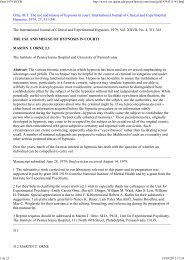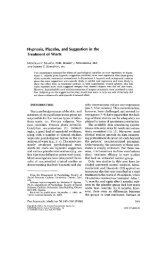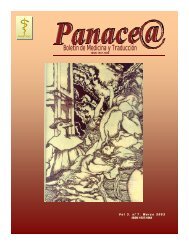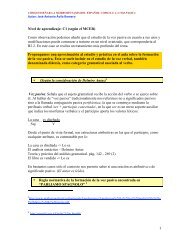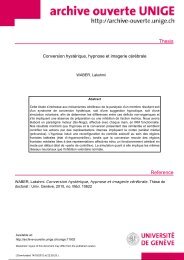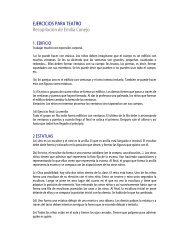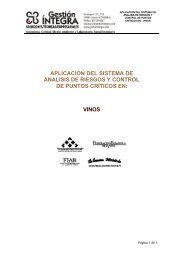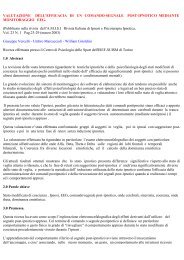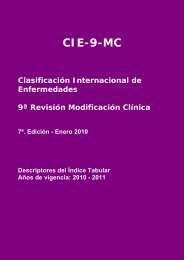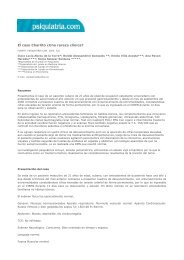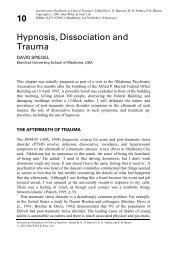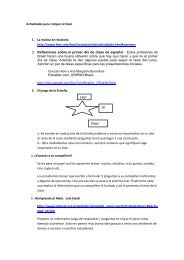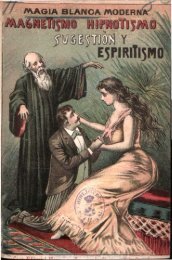Diccionario etimológico comparado de la lengua castellana
Diccionario etimológico comparado de la lengua castellana
Diccionario etimológico comparado de la lengua castellana
You also want an ePaper? Increase the reach of your titles
YUMPU automatically turns print PDFs into web optimized ePapers that Google loves.
FÁBUL FÁBUL 2531<br />
ó injustamente; fa-s-tus, -tOy -tum. perteneciente<br />
al día <strong>de</strong> audiencia (fastas<br />
erit (dies), per quem lege licebit agi.<br />
Ov. Fast. 1. 48); ne-fas-tus, -ta, -tum;<br />
(dies), día en que no se permitían entre<br />
los romanos los negocios públicos; primitivo<br />
<strong>de</strong> NE-FASTO (cfr. NE-, negat. =<br />
infausto, <strong>de</strong> mal agüero); fa-x(=fa-c-s)y<br />
fa-ci-s, fa-c-em, tea (=que alumbra, resp<strong>la</strong>n<strong>de</strong>ce);<br />
fac-u<strong>la</strong>, tea pequeña; <strong>de</strong><br />
don<strong>de</strong> <strong>de</strong>scien<strong>de</strong>n fácu<strong>la</strong> y facha (2.°),<br />
por cambio <strong>de</strong> -el- en -ch- (fac-u<strong>la</strong>=<br />
fac'-<strong>la</strong>=facha), que luego se cambió en<br />
HACHA (cfr. 2.**); fac-ie-s, -ei, -em, cara,<br />
rostro, semb<strong>la</strong>nte, cuerpo, facha, aspecto,<br />
apariencia; <strong>de</strong> don<strong>de</strong> <strong>de</strong>scien<strong>de</strong>n haz<br />
(3.°), y FAZ (2.°), rostro, cara, primitivos<br />
<strong>de</strong> FAC-ERA y hac-era, fachada <strong>de</strong> edi-<br />
ficios, acera. De fac-ies <strong>de</strong>riva el ital.<br />
FACCiA, primit. <strong>de</strong>l esp. facha (1.°), á<br />
que correspon<strong>de</strong>n : val. fat;^e'; prov.<br />
fassa; franc. face; prov. fatz; port. face.<br />
Etimológ. fac-ie-s significa que bril<strong>la</strong>,<br />
bel<strong>la</strong>. Del pref. super- (cfr.) y fac-ie-s<br />
se forma super-fc-ie-s, prim. <strong>de</strong> superficie<br />
(cfr.). De <strong>la</strong> misma raíz bha-k<strong>de</strong>scien<strong>de</strong>n:<br />
fa-c-etus, -eta, -etum (cfr.<br />
suf. -eto), gracioso, chistoso {=bril<strong>la</strong>nte,<br />
bello), primit. <strong>de</strong> faceto y <strong>de</strong>fa-ce-tiae,<br />
<strong>de</strong> don<strong>de</strong> <strong>de</strong>scien<strong>de</strong> facecia (cfr.), y <strong>de</strong><br />
éste faceci-oso; fa-c-undus, -unda, -undum<br />
(cfr. suf. -undo), prim. <strong>de</strong>FAC-UNDO<br />
y fac-und-ia, <strong>de</strong> don<strong>de</strong> se <strong>de</strong>riva facundia<br />
{=abundancia <strong>de</strong> pa<strong>la</strong>bras y<br />
frases bril<strong>la</strong>ntes); foc-us, -i, hogar, fogón,<br />
chimenea; casa particu<strong>la</strong>r, hor-<br />
nillo; fuego, l<strong>la</strong>ma; primit. <strong>de</strong> foco y<br />
fuego {=^que resp<strong>la</strong>n<strong>de</strong>ce, bril<strong>la</strong>ntej, <strong>de</strong>l<br />
cual <strong>de</strong>scien<strong>de</strong> /óc-/7/are (cfr. suf. -i<strong>la</strong>r),<br />
aplicar fomentos al cuerpo para calen-<br />
tarle; primit. <strong>de</strong> re-foc-il<strong>la</strong>re (cfr. pref.<br />
-re), recrear, restablecer (=volüer á dar<br />
calor), <strong>de</strong> don<strong>de</strong> se <strong>de</strong>riva re-foc-i<strong>la</strong>r<br />
y <strong>de</strong> éste re-foc-ilo y re-foc-i<strong>la</strong>-ción;<br />
fe-ne-stra (fe-n = bha-n-J, primitivo <strong>de</strong><br />
fe-n-estra, ventana (=que resp<strong>la</strong>n<strong>de</strong>ce,<br />
por don<strong>de</strong> entra el resp<strong>la</strong>ndor, <strong>la</strong> lu^J;<br />
cuya raíz sirve <strong>de</strong> base á epi-fa-n-ía<br />
{cfr.);fu-l-ica^=grg. -faX-r^p-í?, dór. f aX-ap-í?,<br />
-íSo;, (=bril<strong>la</strong>nte, bel<strong>la</strong>) prim. <strong>de</strong> fúl-ica<br />
(cfr.) ; inful-a (abril<strong>la</strong>nte), banda, faja,<br />
cinta; mitra, turbante, adorno <strong>de</strong> <strong>la</strong><br />
cabeza; prim. <strong>de</strong> ín-ful-as {ch\); fa-v-ere<br />
(fa-v=bha-v-), favorecer, amparar, socorrer<br />
í=lucirse, mostrarse espléndido<br />
á alguno); <strong>de</strong> don<strong>de</strong> <strong>de</strong>scien<strong>de</strong>n: /ao-or,<br />
-or-is, -or-em, prim. <strong>de</strong> fav-or (cfr.),<br />
y éste <strong>de</strong> fa-v-or-ecer, formado por<br />
medio <strong>de</strong>l suf. -ecer (cfr.); fa-v-or-abilis,<br />
-bile, prim. <strong>de</strong> fa-v-or-a ble ;/aM-stu-s<br />
(=*fac-s-tus=*/aü-os-tus), -ta, -tum;<br />
prim. <strong>de</strong> fausto ( 2." ) ; yá-c-íV/a, ceniza<br />
caliente, humo, brasa, fuego; prim. <strong>de</strong><br />
fav-i<strong>la</strong> (cfr. suf. -i<strong>la</strong>);/ao-on-iu-s, céfiro,<br />
prim. <strong>de</strong> FAY-omo; fo-ment-um (=*faümentum=*fou-men-tum),<br />
remedio, lenitivo,<br />
alivio (cfr. suf. -miento y -mentó);<br />
primit. <strong>de</strong> fo-mento y <strong>de</strong> foment-are,<br />
abrigar, dar calor; <strong>de</strong> don<strong>de</strong> se <strong>de</strong>riva<br />
fo-ment-ar (cfr.); fe-r-i-ae (sing. yier-ia),<br />
fiestas, <strong>de</strong>scanso, vacaciones; <strong>de</strong> *fe-si-ae,<br />
(raíz/e-s- <strong>de</strong> <strong>la</strong> primit. bha-s-); <strong>de</strong><br />
don<strong>de</strong> <strong>de</strong>scien<strong>de</strong>n fe-r-ia y fe-r-i-ari,<br />
prim. <strong>de</strong> fe-r-iar (<strong>la</strong> -s- entre dos vocales<br />
se cambia en -r-), significando<br />
etimológ. tiempo bril<strong>la</strong>nte, espléndido;<br />
fe-s-tu-s, -ta, -tum, festivo, feriado, <strong>de</strong><br />
fiesta, alegre, divertido, gustoso; /eá-íw-m,<br />
i, día <strong>de</strong> vacación; prim. <strong>de</strong> fiesta, y<br />
áQ fes-t-ivus, -ioa, -ivum, <strong>de</strong> don<strong>de</strong> <strong>de</strong>scien<strong>de</strong><br />
FES-T-ivo (cfr. suf. -ioo), etc. De<br />
fa-bu-<strong>la</strong> se <strong>de</strong>riva fa-bul-ari, hab<strong>la</strong>r,<br />
contar, primitivo <strong>de</strong> fa-b<strong>la</strong>r y éste <strong>de</strong><br />
HA-BLAR ( por cambio <strong>de</strong>/ en ^), port.<br />
FALLAR = FAL-AR. <strong>de</strong> don<strong>de</strong> <strong>de</strong>scien<strong>de</strong><br />
ESTRA-FAL-ARio (cfr.). De fa-b-u<strong>la</strong> <strong>de</strong>scien<strong>de</strong>n<br />
FA-BLA y hab<strong>la</strong>; <strong>de</strong> fab<strong>la</strong>r,<br />
fabl-anTe, fab<strong>la</strong>-dor, fab<strong>la</strong>-do, fab<strong>la</strong>-ble,<br />
fabli-el<strong>la</strong> (dimin. suf. -el<strong>la</strong>);<br />
*fa-bl-ista, fablist-án, fablistan-ear ;<br />
y <strong>la</strong>s correspondientes con h, como,<br />
hab<strong>la</strong>-do, hab<strong>la</strong>dor, ha-b<strong>la</strong>dor-zuelo,<br />
hab<strong>la</strong>dur-ía, hab<strong>la</strong>n-chin, hab<strong>la</strong>ntín,<br />
HABL-ANTE Le Correspon<strong>de</strong>n: ital.yíívo<strong>la</strong>;<br />
íranc. fable; prov. fau<strong>la</strong>; port.<br />
fal<strong>la</strong> (esp. fab<strong>la</strong>, hab<strong>la</strong>); francés ant.<br />
f<strong>la</strong>ve; wal. fáve; hovg.faule; CQt. fábu<strong>la</strong>,<br />
fau<strong>la</strong>; ital. /o/a=prov. /aw/a; ital. fiaba<br />
=franc. ant. ftabe, etc. Cfr. ital./aí7e//a,<br />
favel<strong>la</strong>re; port. fa<strong>la</strong>r, fal<strong>la</strong>r ; prov. faue<strong>la</strong>r,<br />
fau<strong>la</strong>r; franc. ant. fabler; vá<strong>la</strong>co<br />
héble'í, etc. Cfr. famoso, confesar, etc.<br />
SIGN.— 1. Rumor, hablil<strong>la</strong>.<br />
2. Re<strong>la</strong>ción falsa, mentirosa, <strong>de</strong> pura invención,<br />
<strong>de</strong>stituida <strong>de</strong> todo fundamento.<br />
3. Ficción artificiosa con que se encubre ó<br />
disimu<strong>la</strong> una verdad.<br />
4. Obra en que se narra un suceso ó se<br />
representa una acción inventados para <strong>de</strong>-<br />
leitar.<br />
5. Composición literaria, generalmente en<br />
verso, en que, por medio <strong>de</strong> una ficción alegórica<br />
y <strong>de</strong> <strong>la</strong> representación <strong>de</strong> personas humanas<br />
y <strong>de</strong> personificaciones <strong>de</strong> seres irracio-



